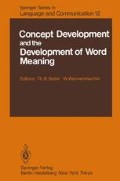Abstract
Many people consider Piaget’s theory to provide an excellent description of children’s growing logical and physical knowledge, and as a direct consequence, educational applications in the teaching of mathematics and science abound. Unfortunately, the practical usefulness of these endeavors has been limited, as I had noted more than ten years ago (Furth, 1970). In fact, this awareness first motivated me to write that booklet on what I thought a more appropriate translation of Piaget’s ideas for the classroom. It may come somewhat as a surprise if I now propose that the habit of dividing up areas of knowledge into different departments may be suitable and necessary for certain purposes; however, from a developmental perspective, what develops is not this or that field of knowledge, but the child as a total feeling and thinking person. The education of the whole child has become a cliché and some of its practical manifestations deserve to be treated with suspicion. Nevertheless, because a good idea can be misused, you do not throw out the baby with the bath.
Access this chapter
Tax calculation will be finalised at checkout
Purchases are for personal use only
Preview
Unable to display preview. Download preview PDF.
References
Furth, H. (1970): Piaget for Teachers (Prentice Hall, New York).
Furth, H. (1980): The World of Grown-ups: Children’s Conceptions of Social Institutions (Elsevier, New York).
Furth, H., McConville, K. (1981): Adolescent understanding of compromise in the political and social arena. Merrill-Palmer Q., 27, 413–427.
Furth, H., Wachs, H. (1975): Thinking Goes to School: Piaget’s Theory in Practice (Oxford, New York).
Furth, H., Bauer, M., Smith, J. (1976): Children’s conception of social institutions: A Piagetian framework. Hum. Dev., 19, 351–374.
Youniss, J. (1980): Parents and Peers in Social Development: A Sullivan-Piaget Perspective (University of Chicago Press, Chicago).
Editor information
Editors and Affiliations
Rights and permissions
Copyright information
© 1983 Springer-Verlag Berlin Heidelberg
About this chapter
Cite this chapter
Furth, H.G. (1983). Young Children and Social Knowledge. In: Seiler, T.B., Wannenmacher, W. (eds) Concept Development and the Development of Word Meaning. Springer Series in Language and Communication, vol 12. Springer, Berlin, Heidelberg. https://doi.org/10.1007/978-3-642-69000-6_9
Download citation
DOI: https://doi.org/10.1007/978-3-642-69000-6_9
Publisher Name: Springer, Berlin, Heidelberg
Print ISBN: 978-3-642-69002-0
Online ISBN: 978-3-642-69000-6
eBook Packages: Springer Book Archive

